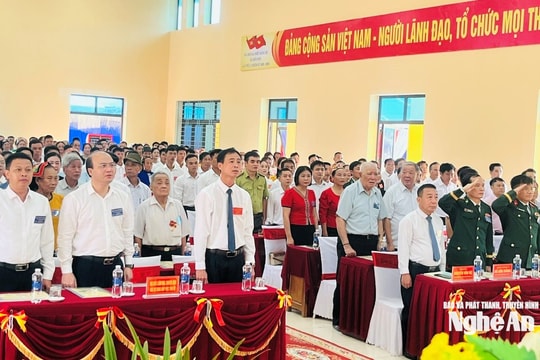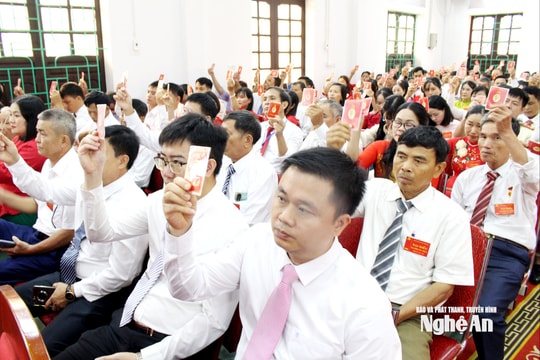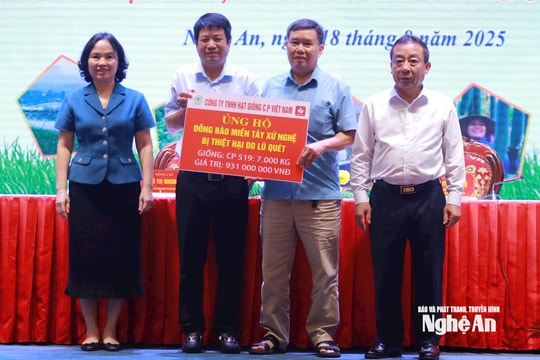Government Office responds to some issues of public concern
The Government Office has just answered a number of issues of interest to the press and public opinion.
1. Are some high-ranking leaders (including Deputy Prime Minister Hoang Trung Hai; Minister, Head of the Government Office, Government Spokesperson Nguyen Van Nen; Minister of Transport Dinh La Thang, who have just been assigned by the Politburo to take on new tasks while still holding positions in the State administrative system, responsible for the work according to these positions?
According to regulations, after the first session of the 14th National Assembly, the new Government's personnel structure will be elected and approved by the National Assembly. During this transitional period, will the direction and management of socio-economic development be affected?
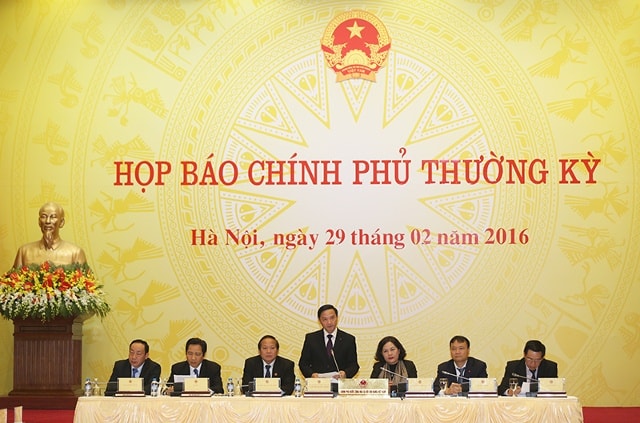 |
| Regular Government press conference February 2016 - Photo: VGP/Quang Hieu (illustrative photo) |
Reply:
According to the Constitution and the Law on Government Organization, the term of the Government follows the term of the National Assembly. The appointment and dismissal of Deputy Prime Ministers and Ministers are approved by the National Assembly upon the proposal of the Prime Minister.
At the same time, according to Decision No. 67-QD/TW dated July 4, 2007 of the Politburo promulgating the Regulation on decentralization of cadre management, Politburo members and Central Executive Committee members are under the management and assignment of work by the Politburo.
Therefore, legally, the Deputy Prime Ministers and Ministers assigned new tasks by the Politburo are still members of the Government, and the responsibility for leadership, management, direction and operation of the work is still guaranteed by the Government and the Prime Minister. Prime Minister Nguyen Tan Dung has adjusted the assignment of work for Government members. The work of Deputy Prime Minister Hoang Trung Hai was assigned to Deputy Prime Minister Nguyen Xuan Phuc; the work of Minister of Transport Dinh La Thang was assigned to Deputy Minister Nguyen Hong Truong; the work of Minister and Head of the Government Office Nguyen Van Nen was assigned to Mr. Nguyen Khac Dinh, Deputy Head of the Government Office (Official Dispatch No. 33/TB-VPCP dated June 5, 2016).
2.At the meeting of the National Assembly Standing Committee (NASC) on February 17, the Government requested to withdraw the Law on Demonstration from the agenda of the upcoming session of the National Assembly. The NASC did not agree with this proposal. Please let us know the reason for the withdrawal and the Government's opinion?
Reply:
According to the National Assembly's Law and Ordinance development program, the Government has assigned and directed the Ministry of Public Security to preside over and coordinate with relevant ministries, branches and agencies to draft the Law on Demonstration. This is an important, complex and sensitive law project. The drafting of the Law project was carried out seriously, carefully and closely. The Government Standing Committee and the Prime Minister met to give opinions and guidance on the ideology, viewpoints and basic contents of the Law project to guide the drafting.
At the regular Government meeting in January 2016, there were many different opinions on a number of important issues during the discussion. Therefore, the Government has not yet approved and requested the Standing Committee of the National Assembly to allow not to submit this Law project at the 11th session of the 13th National Assembly.
Immediately after receiving the opinion of the Standing Committee of the National Assembly (February 17, 2016), the Government Office reported that the Prime Minister had requested the Standing Committee of the National Assembly not to include the content of comments on the Draft Law on Demonstration in the agenda of the 11th session of the 13th National Assembly because the agency in charge of the Draft Law had not prepared in time to submit to the Government for consideration at the regular Government meeting in February 2016.
3. Hanoi Moi newspaper reported that there was a situation where key projects were slow to resume construction after the holidays, typically two key projects, the Le Trong Tan Road expansion and the 361 Bridge, were both slow to resume construction after the Lunar New Year. Although previously, representatives of the investor and contractor both affirmed that they would be determined to mobilize human resources and construction equipment during the Lunar New Year so that the project could be completed soon, contributing to reducing traffic congestion in the capital.
Please let me know what the Government's direction is regarding the issue of construction delays at projects after Tet?
Reply:
Immediately after Tet, the Government Standing Committee held a meeting to listen to the situation and the Prime Minister issued Official Dispatch No. 252/CD-TTg dated February 15, 2016 directing ministries, branches and localities to urgently focus on solving and handling work immediately after Tet, including ensuring all production, business, investment, construction activities and provision of public services to people and businesses.
According to the report, the project to build the 361 bridge across the To Lich River, decided by the Hanoi People's Committee to invest, was implemented from January 4, 2016, with an expected completion date of 18 months. The project to renovate and expand the Le Trong Tan Street was implemented from January 9, 2016, and is expected to be completed on April 30, 2016.
To ensure the progress of the above 2 projects, the leaders of Hanoi People's Committee and the investor inspected and directed the contractor to increase the mobilization of human resources, machinery, equipment, supplies, materials... to ensure completion according to the set schedule.
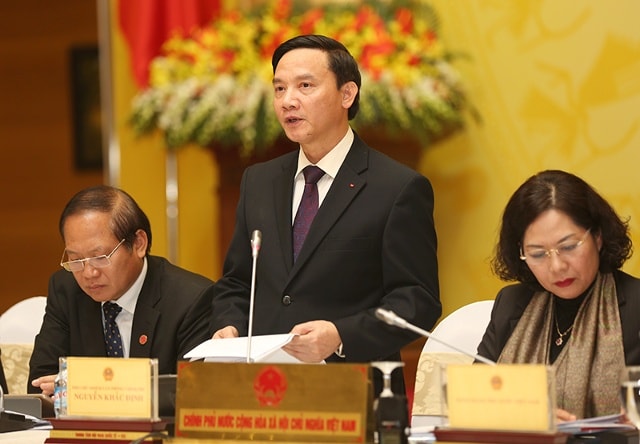 |
| Deputy Head of the Government Office Nguyen Khac Dinh chaired the regular Government press conference in February 2016 - Photo: VGP/Quang Hieu (illustrative photo) |
4. The Press Law (amended) is expected to be passed in March 2016, but in a recent meeting of the Standing Committee of the National Assembly, there was an opinion suggesting that the Law also manage electronic information pages. So will the draft Law submitted to the National Assembly be adjusted in this direction?
Reply:
Currently, the operation of general electronic information sites and social networks is regulated by Decree No. 72/2013/ND-CP and Decree No. 174/2013/ND-CP.
To ensure citizens' freedom of the press and freedom of speech, enhance the effectiveness of state management of the above-mentioned information products, and absorb the opinions of the Standing Committee of the National Assembly, the draft Law is being studied to amend and supplement a number of provisions suitable to the characteristics of general electronic information sites and journalistic information on social networks.
5.Regarding the violations at 8B Le Truc building (Ba Dinh District, Hanoi), although the Prime Minister has concluded on the violations, up to this point the authorities have not yet publicly announced the forms of collective and individual disciplinary action that must be taken. Please let us know the Government's opinion on the delay in handling this disciplinary action?
Reply:
After the Prime Minister concluded (in Notice No. 351/TB-VPCP dated November 2, 2015) on this matter, the Hanoi People's Committee issued a directive (Notice No. 9410/UBND-XDGT dated December 31, 2015) agreeing with the City Inspector's recommendation requesting the Investor, including the urgent completion of the demolition plan for the construction that violated the permit and assigning the Director of the Department of Construction and the Chairman of the Ba Dinh District People's Committee to review the responsibilities and disciplinary measures for the relevant collectives and individuals.
This is a serious violation of the law, involving many levels of management. The Government's viewpoint is to properly implement State regulations on urban planning management, urban order, construction investment management and strictly handle violations in accordance with the law.
6. There are opinions that the Government's Term Summary Report does not fully reflect the situation, nature, and extent of corruption and waste, as well as the causes and responsibilities. In particular, Japanese investors in our country are very upset and most afraid of "under-the-table costs". Could you please tell us how the Government assesses this?
Reply:
The report summarizing the work of the Government in the field of anti-corruption over the past 5 years shows that the work of anti-corruption has had positive changes, corruption in some areas of state management has been gradually controlled. However, corruption is still serious, with sophisticated and complicated manifestations, occurring in many areas of state management. In particular, focusing on some sensitive areas, with high risks of negativity, prone to corruption such as credit, banking; management and use of land, resources, minerals; capital construction investment; and transportation.
In the coming time, the Government and relevant agencies will continue to promote and resolutely implement anti-corruption measures; considering this a regular key task. Focus on improving the effectiveness and efficiency of state management in all fields; promote administrative procedure reform towards simplicity, openness and transparency in transactions between state agencies and enterprises and people; declare and control income declaration according to regulations; strengthen inspection, examination, auditing, investigation and strictly handle acts of corruption./.
According to Chinhphu.vn
| RELATED NEWS |
|---|

.jpg)

